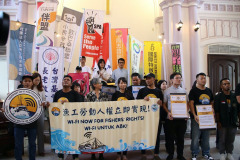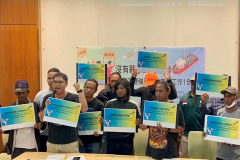無薪父親節:銪富漁船遠洋漁工遭強迫無薪工作15個月,漁工要求資方全額支付被竊薪資80,850美元和海上強迫勞動賠償金
2024/08/07 即刻發布
(記者會後更新資訊,8月7日記者會後,台權會與「Wi-Fi NOW for Fishers’ Rights 倡議協調委員會」成員、新事社會服務中心的李正新督導,陪同九位銪富號漁工前往漁業署開協調會,會中漁業署說明7月22日訪船時就已知船員有欠薪的情況,並表示船東有償還積欠薪資的意願。隔天8月8日,在漁業署官員與海星國際服務中心阮神父的見證下,船東在東港鮪延繩釣協會辦公室已將9名漁工薪資結清。並發放每人新台幣2000元。但第10位因合約到期已被遣返的漁工,其薪資是否已償還並無進一步資訊,我們在記者會上所訴求的處罰與薪資積欠所衍生的利息,仍未獲得漁業署與船東的回應,無法適用勞基法的遠洋漁工,仍因制度的缺失,普遍存在被迫長期積欠薪資的潛在風險。本案目前已進入人口販運防制法的調查程序中。)
台灣遠洋漁船「銪富」號上的十位漁工今天與支持的盟友們聚集在一起,抗議他們在該漁船上無薪工作一年多後所經歷的令人震驚的遭遇,這如同知名台劇「八尺門辯護人」(Port of Lies)的真實案例。漁工們在海上航行 15 個月後,最近才剛剛返回台灣,這是一個強迫勞動、苛扣工資和債務拘束的可怕例子。
「我離開台灣是為了養家糊口,但我們現在卻負債累累。我們被欺騙了。我們的合約說我們進港後就會得到薪資,但直到現在我們都還沒拿到應有的報酬。我的親戚和母國的債主以為我已經拿到薪水了,他們會來我家要求退還他們的借款。我感到羞愧。」「銪富」號漁工Herman如上表述,他因為擔心遭到報復所以要求化名。
十名漁工總共被積欠 80,850 美元薪資
這些漁工在惡劣的條件下被困在海上15 個月,他們的身份證件被沒收,行程被欺騙,而且即使在返回台灣後,也沒有獲得十位漁工估計總共至少 80,850 美元的基本工作工資。工人們反而被告知,他們必須再次返回海上並執行其他的工作,才能獲得已完成工作的報酬。
「我們還沒有收到全額付款,而且仲介不斷改變到底我們何時會收到錢的規則。他們試圖以分期付款的方式向我們支付少於我們應得的款項。我們說不!我們在船上完成所有的工作全力以赴,我們要拿回全額工資。」「銪富」號漁工表示。
「當船停靠在薩摩亞時,我請求代理商支付我一個月的工資。但是,她說不。我急需錢,我媽媽生病了,後來過世了。我無能為力,我真的對這些人失去了信任」Untung 說。
聚集在立法院的漁工和支持的盟友,包括東港印尼海員同鄉聯誼會(FOSPI)、全球勞工正義(Global Labor Justice)、台灣人權促進會(TAHR)、高雄海星國際移工服務中心(Stella Maris Kaohsiung)、憫研顧問(Humanity Research Consultancy)、桃園市群眾服務協會(SPA)、外籍漁工人權保障聯盟、人口販運防制監督聯盟、新事社會服務中心、Taiwan Transnational Corporations Watch(TTNC Watch),以及來自三位立委洪申翰委員、林淑芬委員、以及沈伯洋委員等國會辦公室——一致要求償還被惡意積欠的工資,以及漁業產業必須要有所改革。
遠洋漁工的權利無法被保障是台灣民主的缺失
「台灣應為亞太地區民主治理和尊重人權的領導國家而感到自豪。然而,當外籍漁工在海上無法保護自己權利時,那就是民主的失敗。政府官員宣稱其「漁業與人權行動計劃」和勞動檢查將有效預防違反台灣法律的行為,但事實並非如此。「銪富」號十位漁工的事件,標誌著各方面的失敗。這些漁工被漁業署、船東、仲介、和最終掌控海鮮產業的各品牌商所辜負。」台灣人權促進會資深研究員施逸翔表示。
就在8月5日週一時,遠洋漁工及盟友致函給行政院農業部漁業署,要求賠償,其中包括拖欠的工資和罰款。
「這實在令人憤怒。沒有人希望自己餐桌上的鮪魚海鮮,是由一群遭受強迫勞動和債務拘束的外籍漁工所捕來的。這些漁工面對難以言喻的虐待風險,因為他們在海上被隔離數月,沒有工資,也沒有與陸地上的人任何聯繫。當權者——政府、海鮮品牌商和漁業產業——可以解決這個問題,但他們卻從漁工的孤立和剝削中獲利。」新事社會服務中心李正新社工督導表示。
積欠薪資應負起民法賠償責任
李正新督導補充道:「勞工包含本國籍或是外國籍,因為資方未履行合約規定按時給付薪資,導致積欠勞工薪資而成為債務人,在《民法》中第233條:『遲延之債務,以支付金錢為標的者,債權人得請求依法定利率計算之遲延利息。但約定利率較高者,仍從其約定利率。』因此我們為這些個案訴求,資方應當負起積欠勞工薪資後,依法給付延遲利息,並對於勞工因為遭欠薪所產生的損害負起賠償責任,而不只是單單協商後歸還薪資。」
長期為外籍移工發聲的立法委員洪申翰表示:「這次發生遠洋漁工薪資遭拖欠15個月的事,辦公室在得知消息後也請漁業署積極處理。漁業署在7月22日例行的檢查中,已發現嚴重積欠薪資的狀況,也在8月2日正式發函要求船主盡速處理積欠薪資與改善漁船安全與衛生狀況。對於船主已涉及違法的狀況,也要求漁業署該開罰就開罰,應積極介入輔導就應立即給予輔導。」
政府應依《人口販運防制法》保護漁工
立法委員沈伯洋也表示:「此次發生的銪富漁船勞動剝削案,就凸顯出幾個問題,首先,是遠洋漁工欠缺有效的聯繫管道,包含與家人聯繫的權利,漁業署應盡力促成所有在台灣遠洋漁船上工作的船員保證使用 Wi-Fi 的權利,並建立有效的申訴機制,確保漁工及時得到補救。其次,漁業署亦應強化遠洋漁船勞動檢查的能量、擴大勞動檢查的範圍,期能將檢查範圍涵括至海外所有取得授權的港口,以確保遠洋漁工的勞動權益受保障。最後,則是究責的問題;政府除應協助受害漁工取回應有的薪資報酬及違約補償外,並應依修正施行後的《人口販運防制法》給予被害人充足的保護,以利追究違法人員的相關責任,並透過刑事的究責,期能杜絕類似的侵權行為再發生。」
「根據國際勞工組織的強迫勞動十一項指標,從銪富漁船外籍漁工遭遇的經歷,至少符合以下幾項:利用弱勢處境、欺騙、債務拘束、扣留身份文件、扣薪、孤立、虐待的工作與勞動條件、超時加班、恐嚇及威脅,十一項指標,至少有九項符合,表示強迫勞動情況非常嚴重。當然僱主最該被究責,而漁業署並未真正落實、貫徹由僱主直接付薪給漁工,恐怕也是讓這種情況繼續存在的重要原因之一。遠洋漁業多項嚴重強迫勞動問題,並未真正消失,漁業署卻依然准許僱主經由仲介轉匯薪資;更有甚者,至今許多遠洋漁業的薪資,實際上都是由仲介公司先行墊付,之後才由僱主償還的,等於仲介在經營生意的同時,還要同時負擔旗下所有漁工至少三個月的薪資,並協助支付。這種完全不合理的現象,必須立刻停止。」桃園市群眾服務協會移工政策處主任汪英達表示。
全球各大海鮮品牌也應尊重漁工權利
「銪富」號十位漁工的案例,是台灣漁業在強迫勞動狀況下發展一個明顯例子。外籍漁工主要來自印尼,他們的工作條件十分惡劣,經常在海上工作十個月或更長時間,與家人或外界沒有聯繫。這些漁工捕獲的鮪魚供應給世界各地的主要品牌,最終出現在世界各地的餐桌上。「銪富」號十位漁工及其支持者要求立即支付工資,並呼籲產業必須變革,包括讓勞動部介入遠洋漁業,並對不按時支付工人薪資的公司進行處罰。漁工及其盟友希望終止強迫勞動和苛扣工資的現象,而各大品牌商在其供應鏈中,長期以來一直忽視這些現象。
「台灣的外籍漁工要求在所有遠洋漁船上安裝可靠安全的Wi-Fi,以便他們能夠與工會聯繫、以便他們能夠確認工資、申訴虐待行為,並確保他們的勞工和人權獲得保障,並在問題發生之前就獲得解決,而不要只是補救。移工及其家人應得更好的待遇。我們不僅呼籲台灣政府和漁業產業尊重外籍漁工的權利,也呼籲各大品牌要求其供應鏈中的所有船隊也要尊重這項權利。」全球勞工正義副主任Valery Alzaga表示。
Valery Alzaga補充說:「賦予工人在海上和港口為自己伸張的權力,是努力抗爭結束強迫勞動和薪資苛扣的重要一步,而各大品牌在其供應鏈中長期以來忽視了這一點。」「我們今天要求為「銪富」號十位漁工伸張正義,並要求對該漁業產業進行變革,以便更多的漁工在未來的日子、數月和數年裡,都不用再面臨同樣的嚴重虐待。」
主辦單位:「Wi-Fi NOW for Fishers’ Rights 倡議協調委員會」成員包括全球勞工正義(Global Labor Justice)、東港印尼海員同鄉聯誼會(FOSPI)、台灣人權促進會(TAHR)、高雄海星國際移工服務中心(Stella Maris Kaohsiung)、憫研顧問(Humanity Research Consultancy)、桃園市群眾服務協會(SPA)
聲援:洪申翰立委辦公室、林淑芬立委辦公室、沈伯洋立委辦公室、外籍漁工人權保障聯盟、人口販運防制監督聯盟、新事社會服務中心、Taiwan Transnational Corporations Watch(TTNC Watch)
記者會資訊:
時間:2024年8月7日(三)9:00am ~10:00am
地點:立法院研究大樓101會議室(濟南路一段3-1號)
主持人:
施逸翔 台灣人權促進會資深研究員
與談人:
銪富號遠洋漁船印尼漁工代表
1. Julkifli Soumena
2. Feri Rahardjo
3. Masduki Priyono
Jonathan Parhusip 全球勞工正義海鮮倡議專員
汪英達 桃園市群眾服務協會移工政策處主任
李正新 新事社會服務中心社工督導
新聞聯絡人:施逸翔
附件:
沈伯洋立法委員 發言稿
立法院在去年6月三讀通過了《人口販運防制法》的全文修正,並在今年1月1日公告施行;而依據美國國務院在今年6月公布的「2024年全球防制人口販運報告」,台灣連續15年名列「第1級」國家,顯示修正施行後的《人口販運防制法》,令台灣政府維持推行防制人口販運的基本政策。不過值得注意的是,美方在報告中也提及,有關外籍漁工的勞動權益,尤其是遠洋漁工的勞動權益保障,仍有不少改善空間。
此次發生的銪富漁船勞動剝削案,就凸顯出幾個問題,首先,是遠洋漁工欠缺有效的聯繫管道,包含與家人聯繫的權利,漁業署應盡力促成所有在台灣遠洋漁船上工作的船員保證使用 Wi-Fi 的權利,並建立有效的申訴機制,確保漁工及時得到補救。
其次,漁業署亦應強化遠洋漁船勞動檢查的能量、擴大勞動檢查的範圍,期能將檢查範圍涵括至海外所有取得授權的港口,以確保遠洋漁工的勞動權益受保障。
最後,則是究責的問題;政府除應協助受害漁工取回應有的薪資報酬及違約補償外,並應依修正施行後的《人口販運防制法》給予被害人充足的保護,以利追究違法人員的相關責任,並透過刑事的究責,期能杜絕類似的侵權行為再發生。
台灣以人權立國,對於各種侵害人權的行為,不該有任何的縱容,尤其是行政院在去年核定「漁業與人權行動計畫」1.5版、提出7大因應策略後,更應積極落實,以維護我國的遠洋漁業形象,確保海洋得以永續發展。
FOR IMMEDIATE RELEASE: 7 August
Contact: Shih Yi-hsiang (施逸翔) - Senior Researcher, Taiwan Association for Human Rights
You Fu’s Port of Lies: Wage Theft and Abuse of Migrant Fishers on the Distant-Water Vessel Sparks Outrage
~Fishers Were Forced to Work 15 Months Without Pay~
The ‘You Fu Ten’ Fishers and Supporters Demand Full Payment of estimated USD 80,850 in Stolen Wages and Damages for Forced Labor at Sea
Taipei- The “You Fu Ten” migrant fishers gathered with allies today to speak out against the shocking, real-life Port of Lies they have experienced after working more than a year without pay aboard the Taiwanese vessel, You Fu. In a horrifying example of forced labor, wage theft, and debt bondage, the fishers have just returned to Taiwan after 15 months at sea.
“I departed to Taiwan with the expectation to provide for my families, instead we are falling into debts. We are deceived. Our contract says that we will be paid after we enter the port but we were not paid until now. People thought I had been paid. There are people and relatives coming to our home asking for their money to be returned. I felt ashamed,” said Tappe, a You Fu fisher.
The fishers were kept at sea for 15 months in abusive conditions, had their identification documents confiscated, were lied to about their itinerary, and, even after their return, have not been paid an estimated minimum of $80,850 USD basic wages for their work. Workers were instead told that they would have to return to sea again and perform additional work to be paid for work already completed.
“We have still not been paid in full, and the agent keeps changing the rules on when we will receive our money. They are trying to pay us less than we are owed, in installments. We said no! We did our full work on the vessel, and we want our full salary,” said Dias.
“I begged the agent to pay a month of my salaries when the vessel was docked in Samoa. But, she said no. I was in dire need of money, my mom was sick and later passed away. I was unable to do anything and I have literally lost trust towards these people,” said Untung.
Gathered outside of the Legislative Yuan Research Building, the fishers and their allies–including Indonesian Seafarers Gathering Forum, or Forum Silaturahmi Pelaut Indonesia (FOSPI), Global Labor Justice (GLJ), Taiwan Association for Human Rights (TAHR), Stella Maris Kaohsiung, Humanity Research Consultancy (HRC)–demanded repayment of stolen wages and reforms to the industry.
“Taiwan prides itself on being a regional leader in democratic governance and respect for human rights. However, when migrant fishers have no way to protect their rights while they are at sea, it is a failure of democracy. Government officials have claimed that their national action plan and labor inspections would be able to prevent violations of Taiwan laws, but this has not been the case. The You Fu Ten incident represents a failure on all fronts. These fishers were failed by the Fisheries Agency, the vessel owners, the manning agency, and the brands that ultimately control the seafood industry,” said Shih Yi-hsiang (施逸翔) - Senior Researcher, Taiwan Association for Human Rights.
On Monday, migrant fishers and their supporters delivered a letter to the Taiwanese Fisheries Agency, demanding compensation, including unpaid wages and penalties.
“This is an outrage. No one wants the tuna on their table to have been caught by migrant fishers who are subjected to forced labor and debt bondage. These fishers are at risk of unspeakable abuse as they are isolated for months at sea without pay or any communication with those on land. Those in power – governments, the seafood brands, and the industry– can fix this problem, but they profit off the isolation and exploitation of fishers,” said Jason Lee, RERUM NOVARUM center Social Work Supervision.
“Workers include domestic or foreign nationals. Because the employer failed to pay wages on time as stipulated in the contract, the workers were owed wages and became debtors. According to Article 233 of the Civil Code: 'When the object of an obligation which is in default is the payment of money, the creditor may claim interest for the default, which is to be calculated at the statutory rate. But if the agreed rate of interest is higher, this higher rate shall apply ’ Therefore, we advocate for these cases that the employer should be responsible for paying delayed interest in accordance with the law after arrears of wages to workers, and be liable for compensation for the damage caused by workers’ unpaid wages, rather than just returning wages after negotiation.”,said Jason.
Hong Shenhan, a legislator who has long been a voice for foreign migrant workers, said: "This time it happened that the wages of Distant Water fishering migrant workers were owed for 15 months. After learning the news, my office also asked the Fisheries Agency to actively handle it. The FA routinely reported on July 22. During the inspection, serious wage arrears were discovered, and a formal letter was issued on August 2 requesting the ship owner to deal with the arrears of wages as soon as possible and improve the safety and health conditions of the fishing vessel. The FA was also requested to initiate action on the situation where the ship owner had been involved in illegal activities. It also requires the FA to issue fines when they should be issued, and to actively intervene in counseling and provide immediate counseling.”
Legislator Puma Shen also said: "The labor exploitation case “You Fu Ten” has highlighted several problems. First, DWF migrant workers lack effective communication channels, including the right to contact their families. The FA should try its best to facilitate all Crew members working on Taiwan’s DWF vessels are guaranteed the right to use Wi-Fi and an effective grievance mechanism is established to ensure that fishermen receive timely redress. Secondly, the FA should also strengthen the power of labor inspections on DWF vessels and expand the scope of labor inspections. In the future, the scope of inspections can be extended to all authorized overseas ports to ensure that the labor rights of DWF migrant workers are protected. Finally, there is the issue of accountability; the government should not only assist the injured fishermen to obtain their due wages. In addition to compensation, victims should be given adequate protection in accordance with the revised "Human Trafficking Prevention Act" to facilitate the investigation of relevant responsibilities of illegal personnel, and through criminal liability, it is hoped that similar infringements can be prevented from happening again. "
"According to the International Labor Organization's eleven indicators of forced labor, the experiences experienced by “You Fu Ten” meet at least the following criteria: exploitation of vulnerable situations, deception, debt bondage, withholding of identity documents, deduction of wages, isolation, and abuse, Work and labor conditions, overtime work, intimidation and threats, at least nine of the eleven indicators are met, indicating that the forced labor situation is very serious. Of course, employers should be held most accountable, and the FA has not actually implemented and implemented direct payment of wages to fishermen by employers, which is probably one of the important reasons why this situation continues to exist. Many serious forced labor problems in the DWF have not really disappeared, but the FA still allows employers to transfer wages through intermediaries; what's more, many wages in the DWF are actually advanced by intermediaries first, and then paid later. Reimbursement by the employer means that while the agency is running the business, it must also bear the wages of all its fishermen for at least three months and assist in the payment. This completely unreasonable phenomenon must stop immediately. " said Lennon Wang , director of the Migrant Workers Policy Office of the SPA.
The case of the “You Fu Ten” is a clear example of the forced labor that fuels the Taiwanese fishing industry. Migrant fishers, mainly from Indonesia, work under deplorable conditions and are regularly at sea for ten months or more with no contact with their families or the outside world. These fishers catch tuna supplied to major brands around the world and end up on dinner tables across the globe. The “You Fu Ten” and their supporters are demanding their wages be paid immediately and calling for changes to the industry, including putting the Ministry of Labor in charge of the sector and imposing penalties for companies that do not pay their workers on time. They want to put an end to forced labor and wage theft, which major brands have been ignoring in their supply chain for far too long.
“Migrant fishers in Taiwan are demanding access to their labor unions by having secure Wi-Fi on all vessels so that they can check their pay, report abuses, and ensure that their labor and human rights are respected and solved before they happen by working on prevention not just remediation. Migrant workers and their families deserve better. We are calling not only on the Taiwanese government and the fishing industry to respect migrant fishers’ rights but also on major brands to demand this from all of the fleets in their supply chain,” said Valery Alzaga, Deputy Director of Global Labor Justice.
“Giving workers the power to advocate for themselves–at sea and in port–is an important step in the fight to end forced labor and wage theft, which major brands have ignored in their supply chain for far too long, added Alzaga. “We demand justice for the You Fu Ten today and demand changes to the industry so that more fishers do not face the same grave abuses in the days, months, and years to come.”




